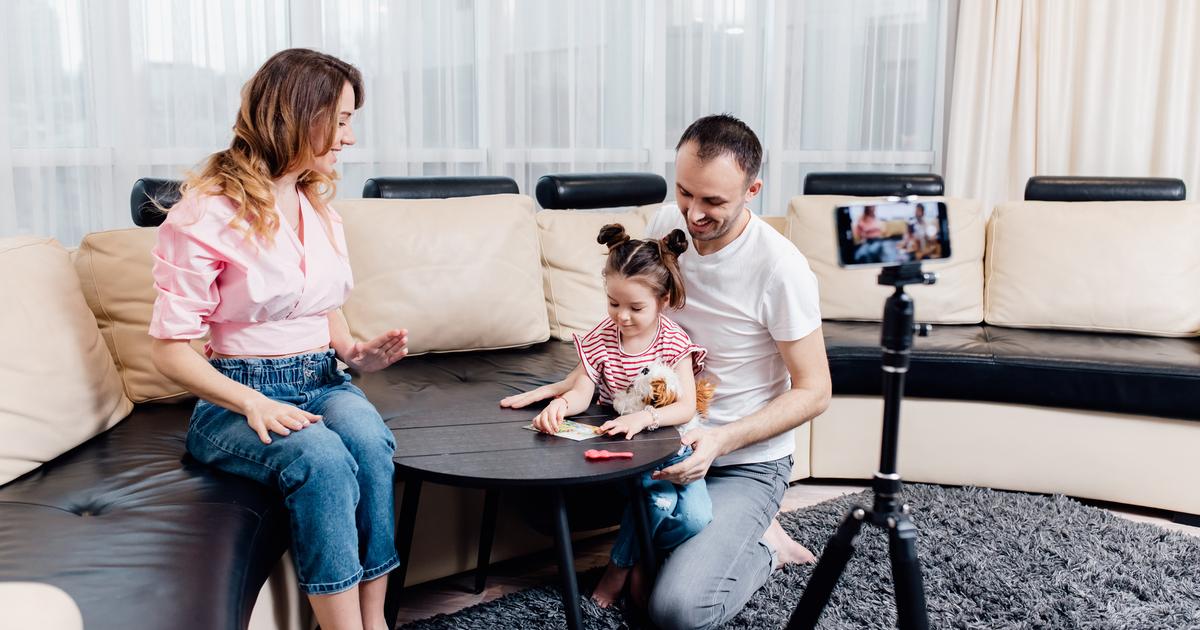A final vote.
This Tuesday, February 6, the National Assembly will proceed to the final reading of the bill aimed at guaranteeing respect for children's image rights.
The latter, tabled by majority deputies Bruno Studer, Éric Poulliat and Aurore Bergé in January 2023, arrives - not without difficulty - at the end of its legislative procedure.
It intends to better ensure that parents respect children's image rights by modifying the rules of the Civil Code relating to parental authority to include respect for image rights, and to better educate them about their obligations in doing so. matter.
“More than 300 million photographs are distributed every day on social networks and more than one in two Internet users take a photograph primarily with the aim of sharing it online
,” recalled the elected representatives of the lower house in the explanatory memorandum of the proposed law, emphasizing the risks of an increasing
“digitalization”
of society.
On average, a child appears in 1,300 photographs published online before the age of 13
"on their own accounts, those of their parents or those close to them"
, the deputies also reported.
However, these photos can seriously harm young people and their integrity.
Child pornography forums
This bill responds to several controversies involving influencers, directly in the sights of the majority.
The latter are accused of overexposing their children on social networks for financial gain.
Parents, who are
“both protectors and managers”
can be caught between conflicting interests.
“The advent of an economy of influence has increased tensions between these two interests, to the point where they can come into conflict, due to the financial, social or emotional gain to be derived from the exploitation of the image of the child"
, thus denounced the explanatory statement of the text.
Among the best known, Poupette Kenza, a young 23-year-old housewife, had for example been accused by her
followers
, during 2022, of showcasing her children, Seyana and Khalis, who have become real headliners.
His Snapchat account was even suspended after his subscribers massively reported his content, reports
Le Monde
.
Similar situation in January 2023, when Jessica Thivenin, reality TV star, was accused of making her three-year-old son believe that she was touching his face with excrement.
For the majority, these scenes considered inappropriate because they are too intimate or sometimes humiliating, must now be prevented.
Especially since this overexposure involves another major risk.
“50% of the photographs exchanged on child pornography forums had initially been published by parents on their social networks
,” the authors of the PPL further warned.
Photos and videos, once published, can fall into the hands of child criminal networks who misappropriate their use.
For elected officials, parents also risk - and in the worst case - putting their children in danger by disseminating information about their daily lives (locations, addresses, lifestyle habits).
Individuals can therefore have free access to this information
“for the purposes of sexual predation”.
Disagreement on Article 4
But if all elected officials agree on the need to combat this scourge, not all put forward the same legal solutions.
The bill is in fact the subject of strong disagreement between the two chambers.
On June 1, a joint committee ended in failure.
The final reading which takes place today is therefore a last chance.
This is the final step for the bill which has followed all the stages of the parliamentary shuttle.
The National Assembly must now rule, in
"final reading"
, on the latest version of the text adopted by itself - in
"new reading"
on December 10 - but taking into account the modifications made by the Senate on December 19. last December, also in
“new reading”
.
However, if the two chambers agreed on the need to expressly include in the Civil Code the obligation of parents to
“jointly protect the right to the image of their child”
[
via
article 2] or yet to grant the possibility for the family affairs judge to prohibit a parent from disseminating content relating to the child without the agreement of the other parent [
via
article 3], they have not managed to find common ground on article 4, which organized a case of delegation
“of the exercise of the child's image rights”
in the event of parental abuse.
If the dissemination of the child's image by both parents
"seriously undermines his dignity or moral integrity"
, article 4 provided that
"the individual, the establishment or the departmental aid service social protection for children who took in the child or a member of the family”
can
“seize the judge”
.
What purpose ?
“Be delegated the exercise of the child’s image rights”
.
Concretely,
"a parent who abuses the image of their children [...] could see the specific exercise of digital parental authority withdrawn, [...] no longer be able to manage the image themselves of her children
,” explained Charlotte Caubel, then Secretary of State for Children, on October 2.
But the Senate insisted on deleting it in
“new reading”
as it saw no use.
The elected representatives of the upper house in fact considered that this procedure did not provide a more efficient solution than the educational assistance measures that the children's judge can already take in cases of "
educational deficiency"
, that represents in particular the
“dissemination of images of the child seriously undermining the
child’s dignity or moral integrity”.
There is therefore no
“legal vacuum”
on this point, insisted the upper house.
While specifying that retaining this article would above all amount to placing very different acts on the same level:
"the forced delegation of [...] parental authority
[to a third person or institution] is in fact reserved for cases of disinterest manifesto of the parents, of the impossibility of exercising all or part of the parental authority or of the murder of one parent by the other
,” recalled the Senate.

